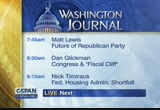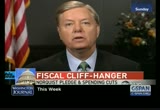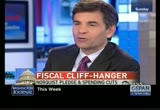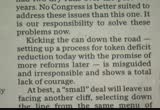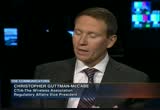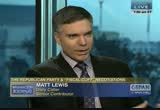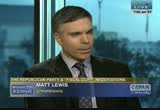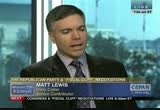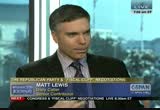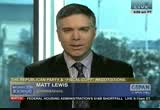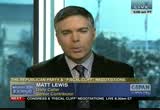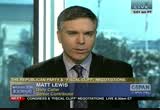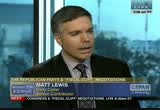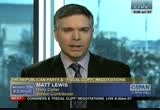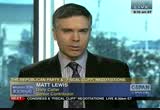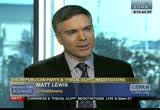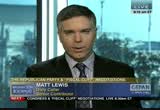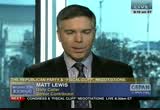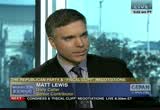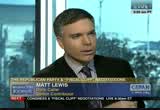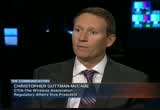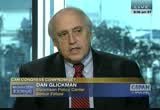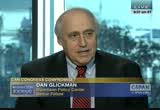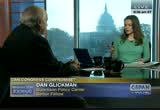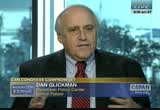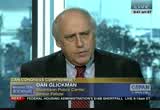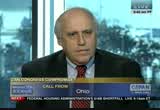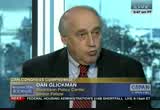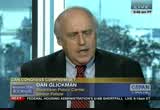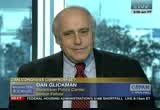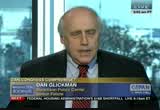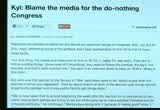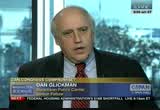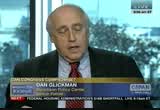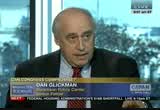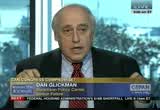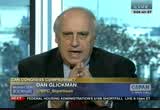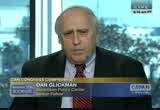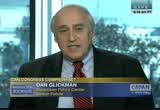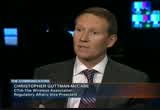tv Washington Journal CSPAN November 26, 2012 7:00am-10:00am EST
7:00 am
areas of bipartisan agreement on the fiscal cliff. "the wall street journal" reporter discusses -- host: welcome to "washington journal." of the senate host: an increase in payroll taxes and the scheduled spending cuts across the board. a couple republicans yesterday signaled they could be flexible on the anti-tax pledge that
7:01 am
7:02 am
the south carolina senator became the second republican senator in recent days to back away from a no tax pledge devised in the decades ago. the willingness to break ranks could prove crucial as gop leaders and democrats try to reach a deal before taxing and spending changes take effect in january. new york representative king says economic conditions have changed since the anti-tax pledge first emerged. he's a republican. that thee gop's say fiscal cliff deal is what defined grover norquist.
7:03 am
let's hear congressman pete king of new york, a republican. he was on meet the press yesterday. [video clip] >> i agree entirely it. if i were in congress in 1941, i would have signed a declaration of war against japan. i would not attack japan today. the world has changed. i think everything should be on the table. i am opposed to tax increases. the speaker and majority leader and the president will be in a room trying to find the best package. we should not take ironclad positions. i would say john boehner has put together pretty good package and has been conciliatory in his language. host: that was yesterday.
7:04 am
7:05 am
if you listen very carefully, peter keane and even saxon chambliss and lindsey graham all said the same thing. we want revenue and are willing to generate revenue, but not by raising taxes. it is very simple. the president does not want to -- the president only wants to tax the rich because he said it during the campaign about 1 million times. millionaires and billionaires. a family of two that makes $250,000 a year are not millionaires. the problem is we are not opposed to revenue. we are opposed to a tax increases. lindsey graham said exactly that and peter king did too. it is against raising taxes. there are other ways to do revenue. the democrats don't like those
7:06 am
other ways. it is called growth. that brings in more revenue. and readjusting the tax code to bring in more revenue. you don't have to raise taxes on anybody. host: let's go to jim in new castle, delaware, on our republican line. caller: good morning. the reason we have to be against tax increases and for spending cuts is to just show that we are a different party than the national sociologist parted as running the white house and the senate right now. economic growth is being held back by the gigantic government in this country. have to go over= a cliff. right now we have to change the business cycle. washington is getting bigger and we are getting closer to the final disaster. republicans have to stand for
7:07 am
something. it cannot just be democrat light. i am a republican and am pretty disgusted by what going on in the republican party. we need to get some conservatives running. we cannot just keep nominating the next guy. we need someone like ronald reagan again. we need to get the whole conservative movement running instead of these consultants that are inside the beltway. the federal government is too big and out of control. washington is rich and the rest of the country is hurting. they're using smoke and mirrors. something has to change. the people have to wake up and it will take a crisis. we are in trouble. but host: we will talk with malice in a little while on the future of the republican party. he is our guest in about a half- hour from now. let's look at the headline in the washington post, on the front page --
7:08 am
7:09 am
norquist is the sequester destroys the u.s. military. according to our secretaire defense, it would be shooting ourselves in the hip. a smaller army since 1940 and the smallest airports in the history of the country. sequestration must be replaced. i'm willing to generate revenue. it's fair to ask my party to put revenue on the table. i will not raise tax rates to do it. i will cap deductions. if you can deduct and around $30,000 or $40,000, you can raise $1 trillion in revenue. the people who would lose deductions would be upper-income americans. i want entitlement reforms to do this. democrats always promised to cut spending, but we never cut spending. i'm looking for more revenue for entitlement reform before the end of the year. >> let me press you one more time on grover norquist. he said you are not inclined to go through on this promise to
7:10 am
raise revenues because you like being a senator. your response? >> i love being a senator and i want to be a senator who matters for the state of south carolina and the country. when you are $16 trillion in debt, the only pledged we should be making to each other is [indiscernible]. we don't generate enough revenue. capping deductions would raise revenue. raising tax rates would hurt job creation. i agree with grover norquist that we should not raise rates, and he's wrong when he says beacon at cap deductions. i want to buy down debt with the money and create jobs. i will violate the pledged for the good of this country on the democrats will do entitlement reform. host: that was senator lindsey graham yesterday. here's what jose has to say on
7:11 am
twitter -- and this in the l.a. times this morning -- nine catechists signed on including mitt romney to grover norquist pledged. -- nine candidates. the signatures and went on office walls like trophies, but an increasing number of republicans are moving away from his pledge and reassessing their resistance to any kind of tax increase.
7:12 am
gene has to say in jackson, michigan. caller: i think they should let it expire on the first of january. cutting entitlements, the national debt, $8 trillion of that is money spent from taken from social security. they are trying to do away with it without having to pay it back. they want to keep the $8 trillion. the tax code worked fine when clinton was president and it can work fine again. host: we're asking republicans what you think about republican flexibility on the anti-tax pledge. here are the numbers to call if you are a republican --
7:13 am
sara is our next caller in edgewater, maryland. caller: good morning. if the republican party continues to do what it does with no tax increases, a social attitudes that they have, they obviously don't recognize the country has changed. the party will self-employed. signs are showing of that. to make a pledge to an ever increasing taxes is insane, because times have changed. you have to have the flexibility to do what is best for the country. obviously, there are still lot of lawmakers out there to don't agree with that. my question to the lawmakers is, who do you surf? -- serve?
7:14 am
do you serve grover norquist? host: are your republican? caller: i am, but i did support president obama in the election, because i could not vote for romney. i was a supporter of ron paul. unfortunately he was not the chosen candidate, and he was on your program not long ago and he spoke about social welfare. we have corporate welfare then he pointed out that is far worse than supporting the seniors or the welfare recipients. this is something that needs to be addressed, corporate welfare, which is far worse. that is what we have to stop. i hope the republican party got the message loud and clear, because the way they are presenting themselves, whether it comes to abortion or financial stuff, it's not good. thank you very much. host: this on twitter, if
7:15 am
republicans give a dollar on taxes, they need to get $3 back in entitlements. senator seitz a chambliss came out last week against the grover norquist pledge. he told a local television station is not a word about the potential primary challenge is to be pledged to raise taxes. he says it cares more about the country than a 20-year-old pledge. he signed the taxpayer protection pledge when he first ran for senate. norquist hit back in a statement. let's hear more about what senator chambliss said. he said he expects his defiance of gop anti-tax orthodoxy to earn him a primary calendar in
7:16 am
2014, when he said he does not worry about that because he cares too much about his country, a lot more than he does about grover norquist. he's a member of a bipartisan group of senators focused on crafting a long-term deficit reduction deal. grover norquist was on cnn on friday responding to senator chambliss' comments. let's listen to what grover norquist had to say. [video clip] >> the commitment he made to the people of georgia was not to me. it was a commitment to the people of georgia that he would go to washington to reduce government spending and to reform government and not raise taxes. if he wants to change his mind and become a tax increaser so we don't have to reform government, need to have that conversation with the people of georgia. he talks about my plan to increase debt, the only plan i think i supported is the paul ryan deal, which reduces the deficit, pays down the debt,
7:17 am
does not raise taxes, and it is a written plan that senator chambliss actually voted for. so i think they caught him on a tv station and he said something scraps that did not make sense. >> have you thought about changing the pledged in any way? >> again, i cannot change the pledge, because t it is,o me. it is not like people are promising this to me. >> it was your group. everybody associates the pledge with new. but that is very kind of them. republicans and democrats, not just republicans, and the democratic congressman from kentucky took the pledge. unfortunately, he broke the pledge and was defeated in the last election. people are a little unhappy that he pretended to be a
7:18 am
conservative democrat and spent a lot of money and raised a lot of taxes and he lost. ben nelson, another democrat, the senator from nebraska, he got elected taking the pledge, said he would not raise taxes, but he did raise taxes when he voted for obamacare. there are 20 different taxes there, many of them directed at the middle class. he could not win, so it decided not to run. host: that was grover norquist on cnn on friday. let's hear what david has to say in new york. are you with us? moving on to joyce in lincoln, nebraska. caller: hi. the last lady hit the nail on the head. several years ago i asked about a problem with a program for homeless people, housing, that needed assistance.
7:19 am
there are people in certain income levels that absolutely need it. they do the jobs that most people would not do and they are paid very little for it. she said what makes you think you have the right to ask anything, given the amount of taxes you pay? i stood there and looked at her and i said, if the word of an individual is based on their network, how tragic. many poor people have fought in wars and lost their lives and have been injured. it was really quite shocking that i was addressed in that manner. i think there is more than one way to commit to your country, not only in the military but as well when our country is in trouble. we all pitch in. my husband and i don't make a lot of money, but i would give $100 a month and cut somewhere
7:20 am
else in my household to defend a country in this time of problems, to make sure that we succeed, that we do what we have to do. mitt romney, i did not vote for, because -of a 40-- 47% remark that he made. i think that they need to make more contact with people that are in need. and i'm not a socialist by any means. i'm dead set against it. i am not against being ambitious, but i am a realist. i know enough people on the other side of the aisle that they call entitlements. a parent that is working and getting $7 an hour and paying utilities, etc., should they have the right to have health
7:21 am
care for their children? absolutely. how do we do that? if we can send a man to the moon, certainly we can come up with a way. i think more individuals would be willing to kick in -- pitch in than what we realize. i would. host: that was joyce from nebraska. our question is for republicans this morning. what do you think about the possibility some republicans are showing on the anti-tax pledge they previously committed to? some comments on facebook. patricia says vote aoll rhinos out of office all rhinos. terry says no tax increase. danny says votes all norquist new economic republican thinkers out. you can join that conversation
7:22 am
by looking for c-span and weighing in. billy is our next caller in augusta, georgia. caller: i think we should raise taxes on the rich. every republican in the house should vote to raise taxes on rich. no matter what grover norquist or senator thune instagram or any of them say. if we can raise taxes on the richest and get rid of some of the loopholes, some of the capital gains, we will start building the economy again. -- no matter what the grover norquist or lindsey graham or any of them say, every republican in the house should vote to raise taxes on the rich. the average republican is not making $250,000 a year.
7:23 am
they're just saying they should not raise taxes because they are republicans. host: are you a republican? caller: i am, but i voted for obama. host: what would it take for you to vote for republican? in terms of the fiscal cliff, sequestration, big budget cuts, what do you want to see them do? caller: if the republicans could find a candidate that would do what ronald reagan dipped, they would gladly get my vote back. as long as they have people like john mccain, sarah palin, and mitt romney, they are just playing. host: here's a story in the new --k times
7:24 am
7:25 am
it can be mathematically proven. a president handed in m speech to be scored. he never came up with a plan how this money would be redistributed and that it would solve the problems. i don't see it. there was nothing mathematically drawn up. the republicans had a couple of plants. loring the taxes and getting people back to work, getting them off the food stamp programs and whatever other entitlement program there is, get them off of that, get them into a job. if you look at germany, they're getting 350 euros per month to live as an entitlement program. none of the germans are going back to work. they are hiring immigrants in
7:26 am
that country to do the work. so you don't really been anything by giving entitlements or lifelong unemployment or checks every month to pay the bills or three washing machines. you don't get people back to work like that. if you lower taxes and do what ronald reagan did and get employment back up and more people working and making more per week, more per month, their chances of getting into the middle-class or the upper-class are much greater. light is much better with a job. i don't think the republican party should raise the taxes on any portion of the country or the whole country. host: we will leave it there. republicans are bailing out,
7:27 am
7:28 am
republican flexibility on the anti-tax pledge? "politico" says to call them the cliff jumpers. that is looking at some democrats' perspective on the fiscal cliff. nick is in el paso, texas, a republican. what do you think about the possibility of flexibility on no taxes? caller: yes, good morning. i believe republicans are being
7:29 am
inflexible. i don't believe the rates should go up, because then taxes would go up. i believe when president obama says taxes will go on the rich, that is bull. its taxes for everybody. you cannot bring down the debt with a $5 trillion in your accumulated over the last four years to pay it down. you need structure readjustment with the entitlements, also, with social security, medicare, medicaid, also, and, also, the tax reform. the republicans have talked about revenue coming in from growth jobs and getting the economy going. when you get the economy going, you get more money coming into the irs and treasury/ when more americans are at work, they are paying. i don't believe it -- it is , woodymr. norquist
7:30 am
said, it is a pledge to the people. some of those senators wanting to raise -- wanting not to raise taxes, that pledge, they knew what would happen to them, they would get run out of state. first i want to see president obama's cards on the table. host: jerry is up next in st. charles, missouri. good morning. caller: one of the things i would like to talk about is the waste in government. i see it continuously in ads on. on a completely off as far as a meter for your diabetes. they say it is free. you have to watch the price.
7:31 am
the waste in government has been going on a longtime. why did they not attack it the last 20 years? the waste has been there forever. god bless representative colb urn because he's going after waste and duplication in government, like eight different agencies covering one thing. i tried a couple of those ads for your blood pressure or a catheter. it is a rip-off. host: how does this factor into the fiscal cliff? caller: right now, not as much, because it is something that has to be done over a long time. the fiscal cliff has been
7:32 am
created. i really think it's going over. they are talking about picking it down the road already. people up there don't care. host: raymond, pennsylvania, good morning. caller: good morning. i am near pittsburg. about thehost: what you think flexibility on behalf of republicans on the anti-tax pledge? caller: the gentleman before me hit the nail on the head. if you want to enlightened orple, get senator it cobucobun expose policy has brought about wasteful spending and then conduct your program accordingly. there was money given to some organization to study whether or klingons. influence cling bo
7:33 am
ask people would they be willing to give more for that program and see what kind of answer you get. the lady from nebraska, she says she would give an extra $100 a month. whenever people say this, why don't you just do it? in in if you think the government is going to do it properly -- if you think the government is going to use it properly, just send it in. ask people if they would be willing to send in money to support the different programs and see what you get. it would be a no. host: let's look at some opinions on the op-ed pages.
7:34 am
7:35 am
7:36 am
fred in lancaster, south carolina, good morning. caller: good morning. the one caller named interior was pretty close to being right. -- named jerry. it wants to cut taxes, how about we bring some of the foreign aid home to pay down some deficits? how about that? we are talking about obamacare. why not put a cap on a $100 aspirin at a hospital and instead say it's $10? i think that's more than enough. host: senator mike lee as a
7:38 am
times. mike lee is also a member of the joint economic committee. tony is our next caller in las vegas, nevada. caller: hi. on the fiscal cliff, this has been the unspoken agenda of the democratic party for a long time. they want the fiscal cliff. it does essentially what they wanted to do, which is to raise taxes and impose a bunch of reductions in military spending. we all know that raising taxes on the rich will not raise enough money to substitute for a dollar rates on middle-class. -- raise. no tax on the super rich would ever recover enough money to even begin averting the financial clip. no reduction in foreign aid --
7:39 am
it is just less than 1% of the federal budget -- can address the fiscal cliff. we need to begin talking exactly the opposite of the way the federal government has worked so far. simply by starting with a budget on what we expect the income-tax to be instead of starting with what we would like to spend. that is backwards. you have to start with what you expect your income to be. host: here is what charlotte says on facebook. she says the tax rates are not creating any jobs, so stop talking out of both sides of your mouth, republicans.
7:40 am
you can join that conversation on facebook. is with us from texas. caller: it is willie. grover norquist is not some big guy with all kinds of powers over congress. what he has is common sense. he knows people don't want their taxes raised. he had people sign the pledge so they can say to their constituents who sent them to congress that they will uphold it. he wheeled his power from the consent of the government, because they are the ones who
7:41 am
want their taxes low. they don't want to pay a bunch of taxes for wasteful government programs. they want the government to do with the government is supposed to do. all these people are democrats calling and saying they are republican and saying that republicans should disregard the grover norquist thing, they don't know what they are talking about. they think they know what they're talking about. there are democrats trying to get on this program and they do just what democrats do. host: this on twitter -- our next caller is scary, a republican in fayetteville, north carolina -- is gary in fayetteville. i think he's not with us.
7:42 am
let's go to kingston, washington, rsose. caller: hi. thank you. this cliff thing is a democrat idea. i don't think the republicans should give in. let the democrats to give in for a change. the republicans should hold back. if we have to go over the cliff, it is not the republicans taking us over the cliff. it is the democrats. we have a democratic president and a democratic senate. they are the ones -- look at all the stuff that got done in the senate. all year we paid their salaries and we did not get nothing from it. thank you. host: arnold tweets --
7:43 am
7:44 am
republican flexibility on the anti-tax pledge. caller: good morning. i would like to talk about how grover norquist has been the target of the democrats. let's talk about senator dick durbin and president obama's pledged to richard trumka and randi weingarten about no cuts in spending. we don't think to talk about -- demonize them. our center dick durbin and president obama have made it clear they will accept no spending cuts. they made this clear to the union chief. -- our senator from illinois dick durbin. host: what should republicans do or not do? our last caller said republicans should be willing to go over the cliff, it necessary. caller: we should shut the government down, if they cannot agree to any spending cuts. we will be coming up to the debt
7:45 am
limit again. they should shut the government down. we will see how the government runs without all these extra programs. senator coburn has identified all the duplication and waste in the government. it is ridiculous that they don't even talk about that. host: senator durban from illinois, let's look and his comments on abc yesterday. he is talking about what democrats would be willing to do to avoid the fiscal cliff. [video clip] >> social security does not add one penny to our debt, not a penny. it is a separate-funded operation. we can do things now, smaller things, played out over the long term, that gives its solvency. medicare, only 12 years of solvency lie ahead if we do not think. those who say don't touch it are ignoring the obvious. we want medicare to be there for today's seniors and tomorrow's
7:46 am
as well. we don't want vouchers or to privatize it it. we can make meaningful reforms in medicare and medicaid without compromising the integrity of the program, making sure the beneficiaries are not paying the price for it, except perhaps the high income beneficiaries. that's a reasonable approach. let me salutes lindsey graham. when he just said about revenue and taxes needs to be said on his side of the aisle. we need to put everything on the table. >> does that include raising the age for medicare eligibility? >> what happens to the early retirees that needs help insurance before that person is meligible for medicare? we need to make sure there is seamless coverage of affordable health insurance for every american. my concern about raising the medicare retirement age is there will be gaps in coverage or coverage that is too expensive for seniors to purchase.
7:47 am
host: senator dick durbin speaking yesterday on abc. we have been talking about republicans signaling flexibility on their anti-tax pledge. it's part of negotiations going on right now over the fiscal cliff. tonight on c-span, we will go back to our archives to show you some of the august 2011 debate and news conferences from the u.s. house and senate and the white house as congress considered and passed the budget control act. that is the law that created sequestration, which is the automatic spending cuts split between defense and non-defense spending. it's all part of what is being debated right now in the house and senate and white house. the sequester is set to take effect on january 1 along with some expiring tax provisions, part of what folks are calling the fiscal cliff. that's tonight on c-span at 8:00, looking back on what started this debate and how congress is dealing with it now.
7:48 am
thanks for all your calls. coming up, the future of the republican party,. with matt, later we will talk with dan glickman on whether congress can reach compromise during the lame-duck session. -- we will speak about the future of the republican party with matt lesis. we will be right back. [video clip] >> you listen to mayor bloomberg, said the damage was an president and maybe the worst storm the city ever faced and the tidal surge was 14. governor chris christie said the damage in new jersey was unthinkable and we had fires and hurricane force winds, massive flooding, deepersnow.
7:49 am
when you looked at that and but flooding to the health care systems and the shutdown of the stock exchanges, you start to get a sense of the massive scale and scope of this storm and yet the networks performed. i have read dozens of stories over the last couple weeks on how for many consumers their only tie to any information or people was through their smartphone, linking social media and other smartphone. while there was an impact on some websites, the networks performed really pretty well. >> my assessment is some networks did well, some networks did less well, but we don't have solid information about this, because there are no reporting requirements on these networks, no standards by which we measure their performance is. it is entirely voluntary whether they want to talk to the fcc or to their state or local governments. i take their word for it that they responded well.
7:50 am
i have heard some of these guys may be did less well. the first step is we have to find out who did well and who did not and how to make sure everybody's doing well. >> the impact of superstorm sandy on telecommunications attems, tonight on 8:0c-span2 8:00. >> "washington journal" continues. . host: matt lewis is senior contributors at "the daily caller." guest: good morning. host: there's a page in the washington journal and it shows governor bobby jindal of louisiana and governor mcconnell of virginia. guest: the republican party needs to do two things simultaneously that seem to be opposite. one is to be more cosmopolitan. if you look at republicans who have done well at appealing,
7:51 am
it's people like ronald reagan. of course a movie actor who could go talk to elites in washington and the ec but also had a populist appeal. reagan democrats in pennsylvania and ohio, blue- collar workers, he could resonate with them. it's fair to say this of mitt romney, and he did not have a populist appeal. just by virtue of who he is, his biography, and his demeanor. mitt romney's brand was always going to be rich republican guy and it did end up that way. host: the morning after the election, you were one of the people who call for changes in the republican party.
7:52 am
guest: the moderation line has become almost the catch phrase for what republicans are going through right now. bobby jindal and others have used similar language since i wrote that the morning after the election. the reason i did it was i think there are still mistakes that could be made and both would be equally damaging. one mistake is to say mitt romney was just a bad candidate and we don't need to take this seriously as a republican party, that we should just ignore it it and it will go away. that would be a tragic. the other mistake would be to read into this, we just need to become more moderate. that would be equally tragic. what really needs to happen is soul-searching and rethinking
7:53 am
re-packaging what is conservatism and what is republicanism for the 21st century. in some cases that might mean doubling down on some of those core values and first principles that republicans believe in, not giving them up but clearly defining what we believe in, says the pro-life movement. being a pro-life party is very important for the republicans. it would be suicide to give that up. how they can communicate that in the 21st century in a more compassionate way is key to modernization. host: you are contributor at "the daily caller." if you would like to draw on the conversation, here are the numbers to call -- there's an opinion piece in the the walln journa --
7:54 am
street journal this morning. guest: the devil is in the details. it would be a mistake for the republican party to give up the core values they believe in. by the same token, the world has changed. the republican party lost pay 71% of hispanics. that is unacceptable. something is wrong, obviously. it cannot be allowed to continue if you want the republicans to ever be in the majority again.
7:55 am
i think the republican party simultaneously as to do a better job of appealing to working- class americans but also appealing student cosmopolitan = = also appealing to cosmopolitan conservatives. the guy lives in arlington, virginia, and built himself up, should not be an automatic barack obama vote. i don't think republicans should just say candidates of all the problems. if you look at the people poised to be the future leaders, marco rubio, bobby jindal, they have this ability. if i were not in the logical, if i did not have core beliefs, i probably would've been a barack
7:56 am
obama voter. he resonates more with me as a person than mitt romney did. maybe it is a generational and. maybe it is i live in northern virginia and my dad was a corrections officer and knocked george romney. obama appealed more to me stylistically. someone like marco rubio or bobby jindal will appeal to more urban americans, folks living in the city's, whbut also have the ability to tap into working- class americans. marco rubio talks about the american dream. everybody thinks he's got to be a great candidate because he is hispanic. that part of it may be. but it is the way he talks about the market and free enterprise, talking about creating an america where your father can be a bartender in miami and his son can be a u.s. senator. that's what the american dream is. host: matt's past experience
7:57 am
includes being the director of the leadership institute, a nonprofit training organization. in march of 2007 he was one of two bloggers invited on john mccain's poor bus on a visit to new hampshire with an interview with the candidate and was named a rising star politics by politics magazine a decade ago. -- john mccain's tour bus. guest: a decade already spiry. host: let's go to our democratic allies in virginia. caller: i do consider myself a democrat. i was willing to consider going some of the direction with obama. i have not been satisfied with his first term, necessarily.
7:58 am
the republicans unfortunately, across almost racist on many occasions. i am engaged to a woman who is from guatemala. she is very smart and very conservative in her personal and social values. just the way the republicans spoke about immigration and things like that, they came across as really racist. so that turned her away and it turned me away. the entire abortion and thing, i think we all know that abortion is not something we want. i don't feel it helps our society in any way. but the way todd akin and richard murdock spoke about it shows their insensitivity to women's issues. a lot of women are tired of white men telling them what they can and cannot do when men cannot have babies.
7:59 am
the republican party has a lot of work to do to repair their image. guest: i agree completely. talking about the immigration issue, if you look at the republican primary, a couple incidents happened. herman cain is an african- american republican, but he talked about building a moat to keep immigrants out. candidates like newt gingrich and rick perry bravely stood up for a more compassionate position for immigrants. they got destroyed by mitt romney, who outflanked them in talking about deportations -- self-deportation. i think it is more complex than people think. you are right. the image of the republican party, it's not just they are
8:00 am
against illegal immigration. the images that they don't like -- the image is that they don't like hispanic immigrants. that is horrible and must be fixed. not just because a lot hispanics tend to be family oriented. but get entrepreneurs some -- ing at on japan of entrepreneur. i think that we need americans like that in this country. we have to abide by the rule of law and we have to secure the borders. i would be in favor of more
8:01 am
immigration. marco rubio supports his version of the dream act. people that want to join the military or go to college to stay in this country illegally. that sounds like common sense to me. i got criticized for this a little bit earlier. part of the brand needs to be compassionate conservatism. i do not mean a return to george bush. that is associated with wars and spending. i'm talking about framing conservative ideas 3 compassionate lens -- through a compassionate lens. i think if you're compassionate,
8:02 am
you look at that in a different way. the same thing speaks to the life issue. the republican party should respect the life of the unborn. how do you talk about the life issue? not about the way todd akin and mourdock did. we just heard one quotation from them. we have to come up with a better name than compassionate conservatism. part of the new brand will be addressing these issues in a more compassionate manner. host: we have a tweet from joe. senators are moderating their attacks on susan rice over
8:03 am
handling of an attack in libya. host: our last caller brought up concerns over the way republicans are reaching out or not reaching out to women. is this a potential land mine, a tough issue for republicans to work through? she is an african american and a woman. guest: the contrast is older white men like john mccain that are attacking her. i think barack obama will probably nominate her to set a trap. i think republicans are right on
8:04 am
the substance. she said things that even i know are not true. she is privy to more information than me. she said it was about the video and the attacks were spontaneous. clearly, she had to know she was misleading. she either misled the american people or she is incredibly naive. i think republicans are right substantively. i think it is politically toxic for republicans to oppose her. host: louanne on our republicans line. caller: i hear the same rhetoric about the republicans.
8:05 am
they are upset about the illegals. what difference does it make where they come from? i have a neighbor that is german. she is upset that she had to come to america of the right way. she gets nothing free from the american government. we just open our doors and say, come on in. please tell me how much abortion costs? how many abortions do we owe these women? do you ever talk about vasectomies? they get off scott-free. you are telling me to change my attitude. the word "illegal" has never
8:06 am
changed. it is a lot of different nations. did not say i am anti-black or anti-hispanic. republicans cannot win with a liberal news media. this is equivalent to check ocelot lea liberal news media -- this is equivalent to check of slovakia -- czechoslovakia with liberal news media. guest: how billy adapt and overcome -- how do we adapt and overcome? part of it is excepting the
8:07 am
reality. it is unfair the republican party has been attacked with this racist moniker. it is a reality. i think it is what it is. i believe the u.s. should secure its border and i believe in the rule of law. you shouldn't be allowed to stream into this country. that is incredibly dangerous. you do not want bad actors coming in who could come over the border with everybody else. we have to take care of the borders. now what do you do? mass deportation?
8:08 am
amnesty? there has to be a way that republicans and democrats can work together to address this problem. it will be nice if republicans did not alienate this growing block of voters. it is shameful and suicide politically. host: cary maryland. -- cary from maryland. caller: i have issues with both parties having problems sharing the pain. to not raise taxes. -- do not raise taxes. i think both need to be done in
8:09 am
a conservative way. both sides always draw a line in the sand. we voted people in and pay their salaries to run the government. do what is best for the country and i do not see enough of that. guest: i think that president obama is to blame for a lot of this. he came in with a lot of political capital. incredibly popular. he has a chance to transcend partisan politics, which would hurt republicans. he could become a leader that is a third wave politician. instead he became a traditional democrat. he was able to push truth health care.
8:10 am
he could have become someone who through flattery and bringing in republicans or political power, he could have exercised leadership. we havehe didn't, trench warfare that has persisted more than four years. he could've solved it. will there be a compromise? talks aboutrker capping deductions and having some means testing. that sounds to me like the kind of a compromise that might have potential to work. we will see how dug in both sides are. there is a chance republicans
8:11 am
were sent a message on election day. we will wait and see. host: here's the piece from senator corker in "the washington post.' " what are the chances of congress acting before they go home for the holidays? do you see some room to negotiate? some republicans are looking to back away from the grover norquist tax pledge if they can see tax reform on the table. guest: there is a problem -- it's going to be in the house. can john boehner get enough republican house members to
8:12 am
support something like this? i think that is an open question. if nothing happens, the sequestration takes over. what makes this a good possibility that something will get done. the republicans' most concerned about this are folks like lindsey graham who are very worried about the defense cuts. will the republicans' desire for a strong national defense overcome their concerns for raising taxes? i do not think republicans will raise tax rates. i do not think it will raise capital gains. will democrats go along with that? tuned.wy
8:13 am
host: are there other republicans you're waiting to see come out and send signals? guest: i did nothing so with king. he is been a modern big city republican. nothing wrong with that. the republicans that are signaling that might be amenable to a deal are the usual suspects so far. will somebody rise that will surprise you? that will be the question. i do not know the answer to that. it is incredibly difficult. there is an incentive to not compromise. "compromise" has become a dirty
8:14 am
word. host: susan in manassas, virginia. go ahead. caller: hi. right when you for started talking, i thought this gentleman gets it. the more you talk, i felt you do not get it. it is about policy. what they stated is in the platform of the republican party. they weren't saying anything that is strange or unique. that is what the republican party believes in. they were strong enough to say it. the problem with john mccain going after susan rice -- he can
8:15 am
disagree with her or that she shouldn't be secretary of state. he went into an aggressive attack. that makes women feel uncomfortable. "here they go again." "they are attacking her." it makes people feel uncomfortable. now he is turning down the rhetoric. "you have to tone it down." host: there is an opinion piece in "usa today." guest: i think both of those things are probably true.
8:16 am
i think susan rice disqualified herself by misleading the american public. i also think there is hypocrisy . democrats have viciously attacked republican women including condoleezza rice. there is a perception that republicans are racist, sexist, chauvinist. i think john mccain needs to do a better job. it is fine to oppose her nomination. host: someone writes about sarah palin for president in 2016. guest: well, look, sarah palin
8:17 am
is a prime example of a woman that was demonized by a lot of people on the left. some said bad things about her son, which i think is a horrible. sarah palin can tap into that populist appeal. but i think that her window has passed. my late friend always thought should be perhaps more powerful and influential become in the conservative oprah rather than enter into politics. i think she could have a major voice in helping move the party and the discussion. host: jerry from huntington beach, good morning.
8:18 am
caller: good morning to you. you mentioned the problem is we branding of the republican message -- is rebranding of the republican message. why not nominate on this candidates? i like the honesty of ron paul. i wouldn't walk across the street to vote for mitt romney. guest: well, ron paul has set a couple of chances to become the nominee and couldn't get it done. his son has a good chance to run for the republican nomination in
8:19 am
2016 and i think he could make a big splash. i think rand paul has a lot of what people like about ron paul but is much more appealing to republicans. there could be a huge backlash within the republican party. you would have these tea party conservatives, marco rubio and rand paul. there are in the u.s. senate and our young and conservative who differed dramatically on foreign policy. marco rubio is more of a kennedy-esque beacon on hope. there could be an interesting debate in the republican primary next time if rand paul and marco
8:20 am
rubio run over the future of the republican party. host: arlington tx, good morning. caller: i wanted to make a comment. republicans have a problem with minorities and hispanics. i am a hispanic man and i don't think about immigration every day wake-u up. immigration is not a permanent topic for me in everyday life. it makes me think that maybe there's something more to it. on the various social issues, i think the republican party pushes me away.
8:21 am
gay-rights, environmental rights. would you change your views on ghts or dealing with the environmental? host: we have a headline. try to find a role in the republican party. guest: the caller talked about immigration. i think that is a threshold issue. there are a lot of hispanics and that is not their top issue. i think everybody -- they want to believe that you like them. if people believe you hate them, it doesn't matter if your
8:22 am
policies to help them. it is a deal breaker. with gays.thing if they think republicans hate them, that is a deal breaker. republicans have to get rid of the image and then we can talk about the issues. marco rubio can talk about the american dream. you want to be able to work hard and live the american dream. that is appealing once they believe republicans do not hate them. there will be a big debate. it is a matter of compassionate conservatism. you can be a conservatism that wants to protect traditional
8:23 am
marriage. but do not be mean about it. you can have gay friends and love them. it is a matter of town. if republicans were compassionate -- some are bitter. if that is the tone, you can write off these huge blocks of voters. caller: good morning. i agree with your one caller from oregon who called about the immigration problem. i am and american of african descent. i feel the republicans and democrats have avoided enforcing our border for so many years that they have created a
8:24 am
problem. i feel the republicans and democrats are afraid to go after those employers that do employed illegal immigrants within our country. if they would have done that, they would have been discouraged from coming here. less thanbe upaid americans and that contributes to unemployment. the criticism of susan rice. it is disingenuous to me after condoleezza rice and general colin powell went before a security council's and gave information that iraq had wmd'd.
8:25 am
s. they had nothing and still confirmed condoleezza rice as the secretary of state. i feel their attack on susan rice and saying she misled the public, she gave them the talking points that she was given by the intelligence community. guest: ok. it is hypocritical for republicans to oppose susan rice, it is typical for democrats to defend condoleezza rice. this is ridiculous the whole thing. if she was the white house secretary, i would say fine. robert gibbs is not the principal. his job is to give the white house's spend. that is fine.
8:26 am
it is jay carney now. they give somebody else's message. susan rice is an ambassador and might be the secretary of state. her job is not to parrot talking points. testdn't pass the smell when she went on the talking shows. her job was to push back and say, "if you give me the information, it has to be true." if democrats think that, the ondi rice was wrong, they should hold susan rice to the
8:27 am
same standard. host: we have a question on twitter. ted in michigan on the republican line. caller: hi. i have voted straight republican until the last several years. i want to address a general concept that you have made. you have talked about the republicans have to change their tone. you are talking about image from the general sense. what would you say as a republican to make our party better? to the people in arizona -- the actions in arizona have spoken everything. the hispanic people i know know
8:28 am
everything about what is going on in arizona. that is an about image or attitude or words. why aren't the republicans listening to you? host: we have a question on twitter. guest: i oppose the arizona law. google "matt lewis, arizona law." i felt it would allow -- republicans are supposed be fearful of big government but it is ok to pull somebody over and ask for their papers. it is much more likely to have that question asked if you are hispanic. that is why i opposed it.
8:29 am
my brand of what i'm advocating would encompass tonal changes and some policy changes. these things will be debated over time, what the changes would be. i did oppose the arizona law. a lot of the problem is rhetoric and image and optics and republicans are guilty of allowing that to metastasize. i think they're going to be some policies that republicans got wrong over the years and will need to be addressed. part of rebranding is recommiting yourself to first principles. the republican party should be the party of life.
8:30 am
akin got into trouble. it is kind of ironic. it was fighting over the right to life seeing partial birth abortion. they won the intellectual argument. some had to do with technology. a son. had the s become a victim of your success. host: dj joins us from houston on the independent line. caller: good morning. i am an independent.
8:31 am
the republicans -- a big problem was it was -- the worst thing someone can do is to say things to appeal to them. the lee atwater tape substantiates something that people suspected. the republicans will say things and that is this honest and something putting republicans on the fast track to obsolescence. it is not necessarily the tone that is offensive. i hate to pull the race card but that is kind of the perception.
8:32 am
perception becomes the reality. guest: chris matthews -- they think everything is racial-coded language. if you say susan rice is incompetent, that becomes racist. we have to have discussion and debate. i think if republicans and conservatives are compassionate -- i knew bush or one that brand associating it with innovations and spending. we disagree but how can i communicate that in a compassionate, loving way? host: matt lewis, senior contributor at the "daily caller."
8:33 am
up next, dan glickman about whether congress can raise compromise on some key issues. also nick timiraos will talk about the shortfall. first a news update from c-span radio. >> in detonations talk on a new climate pact resume today. negotiators are discussing how to fight global warming. the talks have yet to fulfil their main purpose, reducing the greenhouse gas emissions which scientists say are warming the planet. trying to agree on keeping greece out of bankruptcy. they have failed to come up with a strategy for the country.
8:34 am
an update on the middle east. the israeli defense minister speaking earlier said he is quitting politics and will not run in general elections in january. he said he will stay on in his current post until after a new government is formed. that is following the january 22 elections. those are some of the latest headlines on c-span radio. [video clip] >> you listen to mayor bloomberg. he said the damage was maybe the worst storm the city ever faced and the tidal surge was 14. governor chris christie said the damage in new jersey was unthinkable and we had fires and hurricane-force winds, massive flooding, snow. when you looked at that and but flooding to the health care systems and the shutdown of the
8:35 am
stock exchanges, you start to get a sense of the massive scale and scope of this storm and yet the networks performed. i have read dozens of stories over the last couple weeks on how for many consumers their only tie to any information or people was through their smartphone, linking social media and other smartphone. while there was an impact on some websites, the networks performed really pretty well. >> my assessment is some networks did well, some networks did less well, but we don't have solid information about this, because there are no reporting requirements on these networks, no standards by which we measure their performance is. it is entirely voluntary whether they want to talk to the fcc or to their state or local governments. i take their word for it that they responded well. i have heard some of these guys may be did less well. and i think the first step is we
8:36 am
have to find out who did well and who did not and how to make sure everybody's doing well. >> the impact of superstorm sandy on telecommunications systems, tonight on c-span2 at 8:00. >> "washington journal" continues. >> dan glickman is a senior fellow at the bipartisan policy center and a former secretary of agriculture. thank you said much for being here. let's jump into bipartisanship. is after an election the best time to heed calls? guest: after an election the public has spoken. the public gave president obama a clear victory. congress is divided. the democrats picked up some seats in both places. the public has spoken and it is
8:37 am
up to the legislative body and the president to deal with the fiscal cliff and the deficits. there is no better time than after an election. host: you wrote a piece where democrats and republicans agree. you looked at areas where you see agreements. do you see places there are agreement? guest: i think we can reach agreement. the issue of taxes and deficit and spending cuts. you have had bipartisan commission slight simpson-bowles and others. it doesn't take rocket science to reach an agreement to get the deficit down. our system of government was set
8:38 am
up to be contentious. we have something called separation of powers. we further complicate the situation because our congress twoo bodies.nto tebet bodie you turn up the brakes if you don't reach consensus. it only takes people a goodwill working together in a bipartisan way to get things done. it does it mean people have to give up on their partisan differences. pass to be's will served. they have to reach a compromise and consensus. i am optimistic and feel it will be done.
8:39 am
host: you are a senior fellow at the bipartisan policy center. what is the role of the center right now? guest: the center was set up by the last four majority leader's, two republicans and two democrats, to try to reach common ground. it could be issues like housing, immigration, the debt, and others. the goal is to see if we can get people of goodwill in both parties to sit down at to find ways to reach common ground on things that can move the legislative process forward. we have people like myself and senator trent lott and general
8:40 am
jim jones. a lot of people from different backgrounds, and together. toghether. host: you're the secretary of agriculture until 2001. he's been a senior adviser at a wallaw firm. he also served as chairman of the motion picture association of america. also what the aspen institute. low marks for the 2012 election. this is from the people andpress.org. "the desire for by a partnership is not fully shared," is the
8:41 am
takeaway headline. voters want president obama to work with the other side. guest: most independents do want people to reach consensus. roughly 75% of the american people want to see people work across party lines, or least work together to reach consensus. reaching compromise is a unilateral disarmament.
8:42 am
if we want to resolve the problems of the deficit and debt, america's role in keeping its strong, we have to solve these problems. the only to solve problems is to work together. just like in your family. it can lead to divorce. we want some degree of unity and harmony. it doesn't mean giving up on your principles. sometimes you have to reach consensus to move forward. host: here are the numbers to call. democrats -- 202-585-3880. republicans -- 202-585-3881. independent callers -- 202-585- 3882. mike from ohio.
8:43 am
caller: i would like to speak about compromise and congress. we need to know who we're up against. decapolis against the socialist s. -- the capitalists against the socialists. the capitalists are paying 60% of all the taxes paid in this country. they want to put their policies on the capitalists again. on the compromise in congress -- a bad bill you're wanted to compromise on. why should you take half of that
8:44 am
bill just to appease the whole system? host: a scare response from dan glickman. guest: 10 reagan said he would rather get 7% of sopping -- ronald reagan said he would rather get 70% of something than 20% of nothing. there is no reason to have to reach a deal across the aisle. we have a separation of powers. to either work together or you fail and you go into gridlock. the american political system suffers from that. you have to try to work together. i do not see this as a capitalist vs a socialist issue.
8:45 am
those are programs that we do that some might call a socialist. i believe they are the community responsibility. farm programs -- i support farm programs. the strongest supporters are in the heartland and the south, which voted conservatively. you can categorize people as a socialist or capitalist. people think other programs you support our socialist. we're all in this together and trying to do the right thing. host: lia in georgia. caller: good morning. thank you for taking my call. it seems like it is not a
8:46 am
reality-based discussion. it is fine to have the ideology that they do not want to raise taxes. it runs smack dab into reality. and medicare watwo wars that we have to pay for. there is a gigantic responsibility. it is like they are saying that would authorize this spending. i was against the war in iraq. we have to come up with a way to pay for this. i did not understand why in parliament cutting is the only option in republican eyes. you should say i'm never going to go to war and never create
8:47 am
new programs. guest: the caller has raised an interesting point. president clinton said during his speech -- excuse me for one second. it is arithmetic at the convention. it did things add up or they do not add up. if you have medicare and farm programs, you'll have science and other kinds of things, you have to pay for it. there are some no like to see the government do nothing. maybe get rid of everything except national defense. you don't want to raise money for any reason.
8:48 am
we don't have that kind of country. research on cancer and health problems, national defense, science research, farm programs, including social security and medicare. you have to pay for it or you run up a giant debt. i think we can reduce the growth of social security in the future without hurting people very much. host: sean from nebraska on our independent line. caller: you get to many politicians at the state and national levels and all they want to do is represent the party before they represent the people. they go against the party and feel they will be shunned.
8:49 am
they need to represent the people first before they represent the party. host: have you always notice to d this? caller: i think it is getting worse. "the to do nothing congress" is becoming a popular term because they cannot compromise. guest: i was in congress for 18 years. i think it was easier back in the 18th century when i was there to get things done. 1994. my colleague at the aspen institute has written a book on the role of political parties and they have taken on a roll that i don't think the founding
8:50 am
fathers never intended. the issue is leadership. i think that what i found is when leaders are willing to take on the interests that got them into office, then i think they can move the process forward. when nobody wants to take a leadership role or take any risks, then i think the caller is right. then people go back to their own base. they are afraid of losing. what we can do to encourage leaders take risks when they are necessary. i remember when welfare reform came up when i worked under bill
8:51 am
clinton. he was successful. while reagan work with dan rostenkowski -- ronald reagan worked with dan rostenkowski. that is probably a more significant factor than the blind adherence to party. host: let's go on to wanda in florida. hi, wanda. caller: i have a question for you. i paid into social security. i now get social security benefits. every month i have premiums coming out of my check. how can you consider them as socialist programs. we paid into them.
8:52 am
host: stay on the line. guest: i also get social security and i pay my medicare premiums. i'm in the same boat she is. the benefits that are being paid a much greater than the amount repaid in. -- then the amount we pay again . they're not actuarially sound. we have to look at it to see to have these programs solvent for the next 20, 30, 40 years and for my children that will be on social security and medicare 20 years from now. in terms of some of the other programs, it depends on what you're talking about.
8:53 am
is it socialism to support cancer research or to build roads and bridges all over our country? i don't think so. is it socialism to help people when they are hurting because of terrible unemployment? i do not think so. i think we have a responsibility to be fiscally prudent. host: do you have a response? caller: it may be. how are you going to make people take responsibility for themselves if you keep handing them everything they want? guest: i appreciate the question. most people don't want things handed to them. most people want to be able to be part of the american dream.
8:54 am
it has been harder and harder for average people to get into that system where they can become self-sufficient and part of the american dream. that should be our goal. when folks don't have food to eat their housing has been taken away from them because there were some nefarious acts not to the benefits, that i think it is appropriate for the government to step tin. host: senator was on cnn yesterday. he attributes the gridlock on the hill to the 24-hour news
8:55 am
cycle. senator kykl is about to retire -- senator kyl. guest: when i was in politics, we had three or four primary channels and the newspapers had a bigger role. today much of the media is not objective media. it is 24 our point of view perspectives rather than carry out the news. maybe that is bad. i don't think we will turn the clock back. there are greater challenges. we spent billions of dollars in the last election between state and federal and presidential races.
8:56 am
that doesn't help. people give you money and they do not want you to be totally free. i have great respect for senator kyl. "we have met the enemy and he is us," as was said in a comic strip. we can offer them explanations of why it is. it is up to the people we elect to show leadership and up to the american people to demand that leadership. host: you were in congress before you were secretary of agriculture. president reagan and tip o'neill reached in agreement on tax reform. was that a moment of bipartisanship in a way you could see now?
8:57 am
guest: the 24-hour media wasn't there. the massive amounts of money weren't there as much. the main thing is those men and people surrounding them decided they wanted to do what was right for their country and the work amenable to not the man they get 100% of what they wanted. aegis cannot do that in life -- you just cannot do that in life. they were very mature individuals. they tried to do the best for their country. ronald reagan was committed to ending the soviet union and reducing the size of government. he had his basic moral principle. tip o'neill and dan rostenkowski
8:58 am
and bob dole knew they had principles to plight but were there to try to do was best for their country. i served in the house and there was -- on the wall was written by daniel webster in most important thing house members can do is to do things were they to be remembered. that always hit me -- "worthy to be remembered." if people think like that, they can act more in the role of while reagan and tip o'neill and others. host: our guest is dan glickman . represented his district of
8:59 am
kansas in congress for 18 years. dan glickman is our guest. hi, ann. caller: good morning to you. i have the opportunity to hear a speech several years ago. i remember president clinton made a speech about how important it was that we convince people that our government is worth having in the first place. i feel in some ways the has been and assault on our system of government, which is not socialism. it seems like we have a lot of multinationals that -- it is like we require the middle class to be all and -- our firefighters and police. they are all in.
9:00 am
give a kind of a bye to the multinationals that seemed to have the same sense of being american. could you please address that? very interesting question. when president kennedy said, "ask not what your country can do for you, ask what you can do for your country," he is recognizing that we have to pull together as a country. we have this great, wonderful america, and we cannot just think about ourselves only. what i see now is a little bit of not enough of asking what people can do for their country. i do not know whose fault that is. the president can do a better job when he goes out to the american people, saying, folks, we are all in this together. everybody has to share, the rich, even the middle class when
9:01 am
we talk about entitlements. everybody has to pay their fair share of taxes. everybody has to participate in making this country great. those are things of petrie -- those are themes of patriotism, and they seem to be dissipating a little bit as people seem to be mall thing what is in it for me, or how can i benefit? i frankly would like to see the president talking more in the context, even on the tax debates, yes, i think the wealthy should pay more taxes, but i do not think that should be the center of the debate. it should be everybody has to share in making this country better. there has to be a much more cooperative, unitarian type of system. i wish he were talking in more that context, and i wish congressional leaders would be willing to sit down.
9:02 am
the positive thing is that it looks right now like people are more anxious to work this out. host: let's go to brandy station, virginia, jeff, a republican. go ahead. you are on a secretary glickman. caller: i have listened to the secretary saying things that i believe differ with what america is all about. many of the problems is individuals like yourself who have been a part of government. you have become like many of them, millionaires, to fold, threefold. for you to say folks should pay more of their fair share i think is code words that i hear the president and many others use. part of the problem is you do not want the real fair share, which is everybody pays the same thing. i am individual who was raised to be independent, to do the
9:03 am
things that are necessary to become a worthy citizen of this country. when you talk about millionaires or billionaires', the 40% that the president is looking for starts at $250,000 a household. that is not fair to me or many others out there. when you know there are 40% who do not pay taxes -- i know many of them, whether family or friends -- we are talking about income tax. the income tax did not exist until the 16th amendment. it used to be in place to deal with wars. that does not happen anymore. politicians like yourself saw it as revenue to do the things that you want to do. this thing is growing specifically to pay down the national debt, and myself and others would not have a problem with it. we come from a time when bush
9:04 am
and others spent too much, and now it will be even more escalated. i have a problem with governments not having to run hold.i run my house h guest: i respect his point of view. government is not -- a lot of people talk about they want to see limited government, except for their military district or their own farm programs. there is part of any political system. government is not an inanimate object, government is us. we are government as the people in this country, and we speak through elected officials. but i sensed his frustration about the fear that additional money that might be raised will not go to pay off the debt. that is something our elected officials need to concentrate on, developing trust with the
9:05 am
voters. the trust that they can in fact get this done and do it the right way. i sense that president clinton often have that trust, that president reagan often had that trust. certainly the trust that roosevelt had during the 1930's. our elected officials need to work on building trust so the people are not so cynical about what government is all about. host: you mentioned about public perception, what americans want to see happen. here is the gallup, frank newport had this piece. gallup/usa today asked republicans, democrats, -- when we look at republicans, 56 of them said it
9:06 am
is extremely important to avoid the fiscal cliff. democrats, 45%. independents in the middle with 46%. guest: the public as a whole has a consciousness of these fiscal issues and what our debt problems are. we do not want to have to wait for some horrendous event where the stock market goes down 2000, 4000 points, and unemployment goes back up because of the uncertainty of what would happen if we cannot reach a deal on the debt ceiling or getting the debt down. many people suspect republicans are ahead, and are asking political parties to work together. neither side is blameless. i can see lots of places in my own party, as a democrat my whole life, where they were not
9:07 am
willing to contribute. neither party can blame the other for all of the problems. if they do that, this issue will never be solved. host: katharine is up next from north conway, new hampshire, on our independent line. caller: good morning, i have a suggestion that i think both the democrats and republicans would really like. my suggestion would help pay down our $16 trillion debt, which then would help us out by paying less interest for lending us money. bank savings accounts pay almost zero%. during world war ii, people bought more bonds -- bought more bonds and held them 10 or 20 years. why not today have the government issue $25, $50, etc., debt bonds?
9:08 am
they would pay out of maturity, 2.5%, 3% interest. they would be used only to pay down our $16 trillion debt. by paying this down, our yearly u.s. interest expenditures would drop. also, rather than paying china interest for lending us money, u.s. citizens would eventually earn interest, and that would go back into the u.s. economy. why do we outsource our borrowing and outsource our interest paid? let american citizens land and gather the interest. -- lend and gather the interest. guest: that is an interesting suggestion, trying to focus on long-term financing at low rates of interest to citizens of
9:09 am
america. in congress folks an would take a look at it. interest rates are lower than they have been. it hurts savers and help to borrowers. interest rates will not stay low forever because we will get higher interest rates and higher inflation as well. the amount of debt is so great right now that if we did not have the chinese and others buying our debt, interest rates would probably be up considerably because we couldn't sell it anywhere else. that is one of the reasons we have to deal with this problem over not just the longer term, the shorter term as well. host: lauren, burnside, kentucky, democrats like to welcome to "washington journal." caller: yes, i and disabled. when i did work -- i am
9:10 am
disabled. when i did work, i was in social work in texas. i wore many hats. i work in support, housing, i was part of an oversight team that helped solve the 18-year loss. you hear people getting a check, and they say, "those people." and i believe you know this, sir. you were with clinton and i believe him to be a great man. the point is, if you bounced checks, do not even pay for your food. in texas that have a sign, "end for you get food stamps."
9:11 am
there is no free lunch in texas. it is very shameful, that some individuals want people to feel like second-class citizens or bums. what about the corporate welfare, where we are bailing all these people out? they do not want to call this an entitlement. someone was telling me the other day, what in the world do you think this is? it is welfare for the rich. guest: i am very involved in the whole issue of food stamps, hunger, and we do have a
9:12 am
record number of people on food stamps. most of them are working families, children. it has grown in the last four or five years because the economy has been difficult. there have not been the jobs for people to get back into the system. most people do not want to stay on this program, and most of them are on the program for a temporary period of time. i talk about this because some people resent folks for getting these kinds of benefits. i know families in the middle class, and they are out of work, were fired, or were downsized. without some of these programs, we would have much more serious hunger. but the goal is to build the american economy so people do not have to stay on these programs. host: the farm bill still has a shot in one of these issues.
9:13 am
how symbolic is this of the gridlock in congress? being from farm country yourself, how concerned are you? guest: agriculture has been one of the programs that has been exempt from partisan bickering. farm programs have been extremely bipartisan for a lot of different reasons. farmers from areas where they get support from both republicans and democrats, hunger programs are in farm bills themselves. this is one of the only times in history we have not been able to get a farm bill resolved. these problems will start getting very serious. it is symptomatic of the gridlock, although i will say the united states senate passed a farm bill, but it has not been able to get through the house. i hope for the sake of american agriculture that we get this bill done by the end of the year. host: a tear from james in new
9:14 am
york, republican caller. -- let's hear from james in new york, republican column. caller: i am a dairy farmer. it does not bother me too much that the farm bill has expired. people can talk all about entitlements. i do not believe that we need m ilc, milk income lost contact. right now we are at the mercy of big corporations and they set the tone for the price. we make 33 cents to 34 cents on a dollar that every consumer spends in a store, which, for production right now, it is not even close to that price. today there are less than 56,000 dairy farms. my own congressman said that
9:15 am
immigration does not have an effect on that, but right now they're building -- bringing immigrants in and they're working full-time on these farms. the forms can get as big as they want, which forces the small people out. that is 170,000 farms with an average of three family members, over half a million jobs right there. i was wondering if you thought that john boehner, speaker boehner, would be willing to pass this if he thought that they would not cut food stamps or take some out, because that is mixed in together. i believe that is why they do not -- guest: first of all, dairy policy is often the most difficult, and dairy farmers have been hurt the worst of any other part of agriculture. they have not benefited in the last few years like grain farmers have, cattlemen have,
9:16 am
pork producers have. gary is complicated because it is perishable. -- dairy is complicated because it is paris up of. -- because it is perishable. in the senate, cooler heads prevailed and they were able to construct a deal that included farm programs and nutrition programs. host: george tweets in and says -- guest: i think it is a steep fiscal slope, i do not think it is a cliff. we do not want to do that. if we saw unemployment go up 1.5
9:17 am
or two points, the deficit go back up, maybe the democrats would benefit and the republicans would get trounced in 2014. on the other hand, all of money and politics in the 24-hour media, who knows politically what would happen if that were the case? as a partisan i might agree with the caller, but as a patriot, i think we need to get this matter resolved. host: idaho, mark, an independent college. good morning, marc. welcome, you are on the air. caller: sorry. thanks for having me on. i had a quick comment. i think a lot of the hate and discontent going on in washington right now is being fuelled by our attention being misdirected or misplaced. the taxation side of the
9:18 am
question is interesting, but is basically, who is going to pay how much. when it is all said and done, the amount of money our government takes in through taxation is really not going to change that much. it is pretty flat. so the taxation side of the question is not where the solution lays. the real issue that needs to be on the table is spending. guest: i think both have to be on the table. the percentage of revenue as part of our gnp is lower than it has been in many years. we are paying less in taxes overall. that has to be part of the solution, revenue does. there is no question that spending has grown. a caller called in earlier and talked about fighting two wars that are extremely expensive, tens if not hundreds of millions
9:19 am
of dollars per week, and we did not raise taxes to pay for them. in earlier wars, we had surtaxes and things that paid for those wars. that is not the only reason spending has gone up, but it is a big part of the reason. we have to be honest. it is a question of arithmetic. spending and revenues have to be in some degree of function, not dysfunction. knowing that nobody will get their own way all the time. it does not seem that difficult to do. the question is, the people have the will to do it? host: dan glickman, a senior fellow at the bipartisan policy center. thank you so much for your time this morning. guest: glad to be here. host: coming up next, "your
9:20 am
money" segment, with local wall street journal" reporter nick timiraos. >> is cyber monday, and bargains are everywhere on line. it is estimated that this year's cyber monday will be the biggest online shopping day of the year for the third year in a row. the research firm predicts that americans will spend $1.5 billion in online purchases today, a 20% jump from last year. "the washington times) reports that some senators are threatening to end aid to egypt. mohammad morsy has broadened his powers less repair john mccain says that while the u.s. is thankful for his help facilitating the cease-fire between israel and the gaza strip, he criticized his decision, which has prompted days of violent street protests in egypt. another senator, max baucus, the chairman of the senate finance
9:21 am
committee, says that he wants to preserve the estate tax break, which is important for farmers who want to pass down land to their children. he hopes to expand the production tax credit for wind energy. watch the senate live on c- span2. those are some of the latest headlines on c-span radio. >> you listen to their member, who said the damage was unprecedented, that it may be the worst storm the city has ever faced, and that the tidal surge was 14. governor christie said the damage was unthinkable. we had fires, hurricane-force wind, massive flooding, deep snow. you look at that and the flooding into the subway systems, the shut-down of the stock exchanges, you get a sense
9:22 am
of the massive scale and scope of this storm. yet the networks perform. i have read dozens of stories about how for many consumers, their only link to information or to people with through their smart phone, linking social me and they're smart phone. while there was an impact on cell sites, i think the networks performed really well. my assessment is that some networks did well, some did less well, but we do not have solid information because there are no report requirements of these networks. there is no standard by which we measure the performance. it is apparent voluntary whether they want to talk to the state and local governments or not. i take their word for it that they responded well. i also have anecdotally heard that some of them did less well. the first step is we have to find out who did well, who did
9:23 am
not do well, and how we make sure that everybody's doing well. >> the impact of super storm sandy, tonight on "the communicators" on c-span2 at 8:00 p.m. eastern. host: nick timiraos will be our guest for our regular "your money" segment, looking at how taxpayer dollars are spent, what they go toward, and what programs they help people. nick timiraos is a reporter from journal." street - thanks for talking about the federal housing administration. guest: thanks for having me. host: the big headline is the fha faces a big $15 billion shortfall. what does this mean? guest: as the housing boom turned to bust, private lenders
9:24 am
fled and it was difficult to get a mortgage at affordable terms. the f h.a. became the only player standing in the market willing to do low downpayment mortgages until 2008, 2009, 2010. they took on a ton of business, and now more of those loans are defaulting. the fha does not actually make mortgages. they ensure loans that meet their standards, so you will go to a bank, they will make the loan, and they will be ensured by the u.s. -- by the fha. the fha then reimburses the bank. the fha made a lot of mortgages as the boom turned to bust. now more of them are going bad. we saw this four years ago with fannie mae and freddie mac, which played a similar but slightly different role bang. -- a slightly different role. the fha stepped into the breach, but there was going to be some costs associated with that, so
9:25 am
now that bill is coming due. host: is the fha broke? is that oversimplifying it? guest: probably. you could call it broke, but really happened was two weeks ago they completed their annual independent audit. they are projecting -- if you stopped writing new business, so if the fha did not make more loans, the loans that you have made, will lose a certain amount of money. how much do you have in reserve right now, and what is the deficit of that net worth? it is not a capital hole that they are looking at, it is a deficit. right now the independent review found they have $30 billion in reserves, $30 billion in the bank, so technically they are not broke. but the independent audit also found that if they forecast suspected losses, they will lose $46.7 billion off those
9:26 am
loans, so that leaves them with a deficit of $16.3 billion. the law requires fha to have in its bank account of enough money to handle all expected claims. this is the stuff of independent reports that the fha makes to congress, determining whether they will need to ask the treasury for money next year. the white house will do its own review and be able to determine their own forecasts and whether the fha has enough in reserve to cover the losses. even if they have enough money in the bank account, some money in the bank account, if they do not have enough money to cover the expected losses, then they have to turn to the treasury and draw on a line of credit. they would get automatic appropriations. the fha has been around since 1934, end they have never had to do that. they have not had to borrow
9:27 am
money from the treasury to pay, to hold in reserve for potential claims. a number of people have been saying for years this was a likely result of the government housing market rescue, a relatively underappreciated and under reported rescue that the government made of the housing market over the past four years. host: the fha faces a $16 billion shortfall. if you would like to join the conversation, democrats can call 202-585-3885. republicans, 202-585-3886. independent callers, 202-585- 3887. nick timiraos is the lead rider
9:28 am
for the blog "developments." you can see piling up the fha insures -- here is a volume of single-family loans, 90 days or more past due. in blue. in orange, the percentage of all loans in default. why are these numbers important? why are you tracking these trends? guest: that is the bad debt that they have ensured right now. those are the claims they will have to pay in the future. it is the highest it has ever been for the fha. if you look at the number of seriously delinquent loans the fha now insures, it is larger than the pile of bad loans that fannie mae has, larger than a pile that freddie mac has. those two communities also needed an attempt at bailout.
9:29 am
they allow borrowers to make low down payments, they have a minimum down payment of 3.5%. outside a few other government programs, if you're a veteran or live in a rural area, banks are not making loans with low down payments anymore. when common misperception is the fha changed its underwriting standards, and that's not true. what happened is during the housing boom -- 2004, 2005-2006 -- it was much easier the get the lowdown money from private lenders. you did not have to say how much money made. the fha never got into that. they did not change the standards, the threat blew up. money throughet loans anymore. the fha did not do the kind of adjustable rate mortgages that are incredibly toxic from 2005
9:30 am
and 2006. those subprime mortgages have default rates from 40% to 50%, just an atrocious performance. the faa requires 30 year loans, fully amortizing. they did not get into the expanding of products, plain vanilla mortgages. because they require the minimum down payment, they do not have a minimum credit score for most things. most things go down into a low credit's core territory because they do not want to have to take back loans. -- a low credit score territory because it and not one have to take back loans. as the private sector pulled away, you have the fha filling in with these low down payment loans. you could just 3% in the game, it is very easy, quick to owe more than your home is worth. if you experience any kind of income shock -- job loss, death,
9:31 am
divorce -- there really is no cushion. so you have seen is a number of these loans going bad. another large problem the fha had one of until 2008, they had a program that allows you to put down no down payment. you could get a gift from a family member or friend or more from nonprofit groups, in which case the down payments were often funded by -- you were buying a new home from the building, they could not make a gift from the nonprofit group. you're really did not have any skin in the game. mortgages have performed terribly. the only make up 4% of the fha mortgages. but they make up 13% of those seriously delinquent loans.
9:32 am
the project $15 billion of costs and losses to the fha, something fha was warning about in 2008. congress was late in shutting it down. there was some resistance to that. there has not really been a lot of careful thought going into federal housing policy. another example would be last year the fha had their mandatory blown list. they can only ensure up to a third-. those limits came down modestly. they raised the loan limits. for the first time ever, you had the fha able to guarantee loans that were larger than fannie and freddie, $729,000. that is 3.5% down payment, and while those loans really do not account for a lot of the losses,
9:33 am
they show that there is kind of a -- an inconsistency in federal housing policy. on one hand you hear lawmakers in washington talking about the desire to get the government out of housing, but when push comes to shove, everybody is scared that if you pull back too quickly, you will -- people will not be able to get mortgages. now that this report has come on, you go through a lot of outrage in congress. we should not tolerate any losses, yet it is what it is. host: let's hear from neck in pleasanton, california. hi there. caller: i got through after months of trying. host: glad you made it. caller: me, too. i was about to give up. anyhow, i think the federal government makes a guarantee in all these loans they have been doing.
9:34 am
when they do that, the banks, the loners, do not have to worry about it. it is the same thing with public employee pension funds. they're claiming that they're getting 7.5%. so when they lose money, they ask the public to repay them money for their pension, and i do not think that is right. that has got to stop. the other thing is, the housing market was going crazy because people were buying homes and reselling them at greater profit, and they were bragging about all of this. host: ok, let's go to nick timiraos and get a response.
9:35 am
guest: it is a very common view. people on both sides of the aisle often say we like to see the government not play this role bang in the housing market. some say the government should play no role b. if you look at the history of federal involvement in the mortgage market, it goes back to the depression, and we really have never had, since the great depression, a fully private mortgage market, either fannie mae or the fha, and and freddie mac after 1970. they have played a significant role in guaranteeing mortgages. go back to 1990, the only period in which those entities account for less than half of all loan backstops, 2004, 2005, 2006, which frankly were the worst performing years in the market. so there is definitely a debate to be had in washington right now over whether the government
9:36 am
should back over 90% of our mortgages. there is not really a lot of desire for that to continue, but the question is, can we go back to a history that maybe it did not exist? that is where the debate will be interesting. host: the federal housing administration insures $100 trillion in home loans, over 730,000 homes in short are in delinquency. the fha's predicted shortfall is $16 billion. build tweets in and say the fha is broke and it would not pass a simple stress test. this is the government can print money out of thin air, it is ok. what is the government plan? guest: they can make money in a couple of ways. a charge insurance premiums to people who take out fha loans. right now you pay an up-front
9:37 am
insurance premium, so when you buy a house, you pay a percentage of the loan amount up front, and a lot of people will lead into the mortgage and you pay an annual at insurance freedom -- insurance premium. that annual premium will be raised again. that is an easy way for the fha to bring in revenue. the other change that they have announced they will make -- right now, after you have a certain amount of equity in your home, or after five years passes -- both have to happen -- you will no longer have to pay them that annual mortgage insurance premium. it lapses. the fha will do away with that policy. starting sometime next year, new fha borrowers will have to pay that annual insurance premium, which is pretty expensive, for the life of the loan.
9:38 am
that is another way the fha will bring in more projected revenue. the point in time we are all watching right now is what happens next year when the white house sends its forecast. will the fha be able to boost revenue enough on paper, and will the stress test forecast that the white house uses on home prices and interest rates be as severe as what the independent auditor use this year? the fha is also pursuing settlements of large banks for failing to follow a standard protocol when it comes to originating fha triple mortgages. they have sued along with other major lenders this year, along with board janette -- with deutsche bank and other lenders.
9:39 am
i would expect legal actions to replenish fha reserves. host: banned from michigan, the independent line. -- dan from michigan, the independent line. caller: is it true that there is 18 million homes in the united states that are vacant? guest: i am not sure of the exact number. the vacancy rate was very high a few years ago. it has come down quite a bit, in part because investors have been buying up a lot of the homes, a lot of them have been converted into rentals. there is still some excess relative to where it has normally been, but is down from the peak of a few years ago. you can see that because home prices have begun to turn in a number of markets. they are rising. in some places significantly, after several years of decline. host: steve, northport, new
9:40 am
york, a democrat. good morning. caller: my question is, as a potential home buyer, looking for houses on long island -- the problem is, how do i address the market? if the government is intervening in the market this much, how do i know what a fair price is? you know the government is just born to print the money to buy up the quantitative easing. they will put up $80 billion a month. what does that even mean? is that even relevant? it is frustrating in here on long island because i have heard several stories for three years, people not having paid a penny. guest: you raise a number of interesting issues. i do not think it has a whole
9:41 am
lot to do with this $16 billion accounting move, but it is a plant in flat in the wrong moment when an agency has never required taxpayer information money and now suddenly needs it. with respect to the housing market, i think what you're seeing is more people are deciding whether it makes sense to buy a home based on long-term rather than can i buy this and flip it three years later for profit. if you're looking to buy a home right now, mortgage rates are very low, but you should not buy based on expectations -- on expectations that the prices are going to up because they are probably not. the northeast is one of the weaker housing markets right now, and one of the reasons for that is that in new york and in new jersey and other states, there are serious backlogs of foreclosed properties. courts are required to process
9:42 am
foreclosures in certain states, and because banks ran into problems with the improper processing of foreclosure paperwork, the courts, particularly in new york and new jersey, have come down and said you need to prove to us that you were not falsifying or forging documents when you come to foreclose. they have asked lawyers for banks to take certain steps. the upshot of that is it has dragged on for several years now. so there are real fears over what happens when all of these homes, on to the market. at the same token, interest rates may not be this low forever. if you find something that you think you can handle the monthly payment for the long haul, you might expect massive home price
9:43 am
appreciation. it is a decision worth waiting right now. host: this headline, "new chance, new danger." it profiles one man getting a third shot at home ownership. the story goes on to say that the agency has become a major source of cash for so-called rebound buyers. a burgeoning crop of homeowners with past defaults who otherwise would be shut out of the market. one of our viewers who follows us on twitter says, "some people do not deserve a mortgage." guest: we learn that lesson the hard way the last five years. you should have to make some kind of a down payment. you should have a debt-to income ratio, you should be qualified
9:44 am
to make that monthly payment. the fully amortizing loan helps because it will not reset to some four former level in the future. there are other steps we can take. a lot of people feel -- ben bernanke the last two weeks gave a speech in which he says he thinks the pendulum swung too far the other way. the fha was not created in 1934 to make a huge profit for the government. it was created because private lending had disappeared as a result of the depression, and we needed an entity to stabilize the market. it is probably true that the fha, if it had not existed going into this crisis, there is a good chance we would have had to create something like it in order to provide a
9:45 am
countercyclical credit stabilizing force. that is what the fha has done during the current crisis. a lot of people in the real- estate industry say home values have fallen so far, people's savings were wiped out when the stock market went down. if you demand a 20% down payment for everybody, very few people will be able to get into homes, and you will shut out qualified people who have jobs, who can be responsible homeowners, who will just sit on the sidelines and perpetuate our own decline. i do think it is a valid question going forward -- is 3.5% down payment enough, or are we setting up folks to fail if they do not have more skin in the game. in the long run, you did not want a government agency to be doing that. maybe a different question for the moment, where the fha is plain that counter-cyclical role that they were playing in the
9:46 am
market. host: steven, you are on with nick timiraos. caller: i used to be in a position in my county where i saw every cell that happened in the county. i knew then, when the politicians -- when the bubble was about to burst, that they were politicians did not see this coming. it is very obvious that they're still going to walk away from it. a lot of this is blamed on banks and wall street. it should not be. janet reno was going to bring charges against banks that did not alone people this money. so it goes back to the affordable housing act and so forth, and the administration made it worse and it should have been stopped a long time ago.
9:47 am
guest: that is certainly a popular narrative, that the push to expand not just homeownership it but affordable housing was the genesis for the crisis. i think that sometimes there are some valid points that we push home ownership of people who were not ready for it. you don't see a lot of mortgage executives in 2004 through 2006 saying that the government is the reason i am making all these mortgages. remember, subprime mortgages were extremely profitable. banks were reporting huge margins -- margins on these loans, and studies have been done that show that folks who qualified for prime, standard fixed-rate mortgages were instead given subprime loans largely because that was more profitable for the brokers that were originating them, for lenders who were securitized in them.
9:48 am
it is an interesting narrative, but i'm not sure how well it will hold up in light of what happened over the past decade. host: gary in kamahl, independent line. -- in colorado, independent line. caller: good morning. i would like to ask a specific question that addresses the role of banks and the amortization of mortgages. the average mortgage, a 30-year mortgage, you will end up paying on your person of interest up front. you may have a $2,000 a month payment. i've never heard anybody discuss this in relationship to this particular issue in the housing bubble and what have you. i just wonder if this gentleman can understand and expound on that why is it that the banks
9:49 am
give -- get their profit up front, and if there is a default, there is a default on principlal? guest: as the caller noted, you have a significant interest payment in the first few years with a long-term loan like that. perhaps there will be more discussion here. do we really want to incentivize that particular product? it also creates funding for banks. that entails a whole set of government backstops so we can get a wide pool of buyers to come in and purchase these mortgage-backed securities. do we push more people into a 15-year mortgage products, where you will pay over the life of
9:50 am
the loan its interests. a lot of people do not have 30 or 40 years, so they're using it to lower their monthly payment. by lowering their monthly payment, they can buy more house, take on more debt. that does help push up home prices. it is not something the real- estate industry is particularly excited to see go away. host: on our c-span feed, c-span junkie says -- host: also, chris shares a story -- guest: the second mortgage issue is an important one per a lot of people have said we have done too much ownership and that was
9:51 am
a mistake. we did push homeowners are probably too far, but if you look at the most problematic mortgages, they were people taking cash out of their homes, and we did not have incomes going up very much in this country during the past decade. home prices were rising. if you wanted to improve, the kitchen, landscaping the backyard, putting in a pool -- they were not necessarily mortgage problems created for people buying houses. a lot of people took out second liens, did refinance. it will be interesting to see if congress -- should the first mortgage lender decide whether you can put a second lien on your property when that takes all the remaining equity out of your home? you also raised that story before about the rebound buyer,
9:52 am
the boomerang buyer, people who elected foreclosure years ago and are now coming back to buy loans. because fha probably has the easiest credit box right now, to the extent they come back -- and i do not think you will see a rush of them -- but there are more of them right now, partly because this crisis is gone. there will be some people who prepared that credit, and the fha is going to be a place for those buyers to get loans. they only require you to sit out two years if you have then a short sale, so you share your -- you sell your house at a loss, you take the loss. three years in some cases, and there is some discussion of whether they should get rid of those arbitrary timelines altogether in order to allow people who have relatively good credit all their life but they ran into one traumatic episode
9:53 am
over the past few years. should they be able to come back if they correct it? or repair their financial situation? host: another tweet says -- let's go to jack in annandale, virginia, a democratic column. it is our regular "new money was pu like, but thanks. my fingers are crossed. i am in section a. what effect will this have on us section eight people. guest: you are renting, is that
9:54 am
right? caller: i am sorry? caller: yes. guest: the fha is relief for people who own their homes. caller: 9 me interrupt you for a moment, please -- let me interrupt you for a moment, please. guest: i really do not think this is going to affect section 8 housing in particular, that is funded through different programs. the fha is for people who are buying houses. the only way this would potentially affect people renting, whether they oare not n the section 8 program or not, is whether they would buy a house any time soon. it will not have an immediate impact on section 8. host: jake, new hampshire, on
9:55 am
our democrats line. caller: good morning. i would like to get a comment in on -- i bring all this on the congress because they made it mandatory that the banks have to give out so many loans. when i worked in a shop and i saw people who had a first house and they wanted a second house, if they did not get a loan, they would go and show discrimination right away. i would like to get a comment on that. guest: i am not sure the evidence bears that out. congress tried to expand homeownership as widely as possible, but sometimes there is a discussion of the affordable housing goals that fannie mae and freddie mac had, that were mandated by us, not by -- that were mandated by hud, not by congress. they had to go to underserved communities. of course, one of the problems with that narrative is that a
9:56 am
lot of the mistakes that were made it especially with fannie mae and freddie mac, those are the liar's loans, were buyers -- where borrowers did not have to provide any documentation of their income, so they inflated their income. if you are inflating your income, those loans were less likely to count toward the affordable housing goals credit. certainly there were cases in which banks were under more pressure to make more loans in certain markets, and that may have contributed. a good example, there was a thrift in california that brave -- that gave back its charter because it did not want to be under those rules. that thrift became known as quest mortgage.
9:57 am
it is a debate that i am sure will go on. it is an important debate to have, but it is also important to look at some of the evidence there. host: larry in rockville, maryland, an independent. hi, larry. caller: i have a question and comment. my first button is this. v.a. loans were in there to get less restrictive, offer 100%, and yet there default rate is lower. why? second, my other thing is a comment. the breakdown in this was not the buyers or the lenders, it was in the securitization process where the rating agencies raided these mortgages, investment rating. therefore, guess what --
9:58 am
deutsche bank, the retirement fund in pennsylvania, the orange county, california. that is where the breakdown was. had the rating companies rated this stuff like they should have, there would not have been the securitization. there would have been a bubble only in the housing market and not nearly so severe. guest: that is a good point. i do think that is overlooked sometimes. people are not studying the risks of the mortgages they were buying. you hear all these stories about people over-levering on their homes. you later find out that the funding was in securitized trusts somewhere. clearly we relied too much on the ratings. be relied on some -- we relied on assumptions that home prices
9:59 am
would go up forever. if it did, then it might have been a triple-a-rated mortgage- backed security. i do think it will bear watching what happens with the v.a. i do not know why it is that v.a. delinquencies are lower. it may be that banks are more proactive in reaching out to borrowers when something happens. these are veterans, after all. perhaps it is a different mixture of borrowers in spending. they allow no money down to the program is only available in some areas, but if you look at the census definition of what counts as a rural area, there are some areas close to the cities where home builders have been ramping up the past decade so you can any -- so that you can get a no-money-down loan
157 Views
IN COLLECTIONS
CSPAN Television Archive
Television Archive  Television Archive News Search Service
Television Archive News Search Service 
Uploaded by TV Archive on

 Live Music Archive
Live Music Archive Librivox Free Audio
Librivox Free Audio Metropolitan Museum
Metropolitan Museum Cleveland Museum of Art
Cleveland Museum of Art Internet Arcade
Internet Arcade Console Living Room
Console Living Room Books to Borrow
Books to Borrow Open Library
Open Library TV News
TV News Understanding 9/11
Understanding 9/11